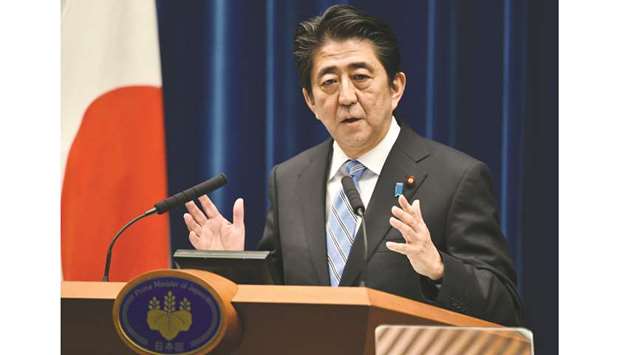Japanese Prime Minister Shinzo Abe yesterday called for stimulus measures to support the economy as it recovers from typhoon destruction and takes the strain from an October sales tax hike.
The measures will also include steps to maintain economic momentum after the 2020 Tokyo Olympics, according to economy minister Yasutoshi Nishimura. The size of the package will be decided after the measures have been discussed, Nishimura added.
The planned fiscal stimulus comes as the economy weathers the impact of a sales tax increase on October 1 and a global economic slowdown that has battered Japan’s exports.
The economy is forecast by analysts to shrink by 2.7% in the final quarter of this year as the tax hike crimps consumer spending and global demand continues to show weakness.
While the size and scope of the package remains to be seen, the news of a fiscal package will likely be welcomed by the Bank of Japan. The central bank last week chose to keep its stimulus unchanged, though it said it would keep a close eye on the impact of the global slowdown on Japan’s economy.
With monetary policy seen close to its limits in supporting growth, expectations for extra government spending have spread in many parts of the world. The need for greater fiscal stimulus has been heavily flagged by former European Central Bank chief Mario Draghi in recent months. New International Monetary Fund head Kristalina Georgieva called for a more active role for fiscal policy to boost sagging growth last month in Washington.
BoJ governor Haruhiko Kuroda said earlier this week that the ultra-low interest rate environment created by the central bank’s stimulus program makes fiscal spending by Tokyo more powerful, though he didn’t call on the government to spend more. “The package will put the BoJ in an easier position,” said Kazuma Maeda, an economist at Barclays Plc, adding that it would support the economy without the central bank taking additional action.
“If the bank chooses to add stimulus, it can also say the effects of its stimulus will be amplified because of policy co-ordination with the government,” he said.
Abe called for the package on the same day data showed household spending jumping by a record 9.5% in September. The stronger-than-expected increase adds to concern that a slump in private consumption after the tax hike in October from 8% to 10% will hit the economy harder than forecast.
Nishimura said the latest figures hadn’t changed his view that rush demand ahead of the tax increase wasn’t as strong this time round as in 2014, when the tax last went up.
The call for the economic stimulus package comes a day after Abe announced the first round of spending on disaster relief to help the recovery from Typhoon Hagibis last month.
The Mainichi Shimbun reported earlier this month that Abe would call for a stimulus package worth ¥4tn-¥5tn (up to $46bn) that combines resources from a supplementary budget for the current fiscal year ending in March 2020 and the regular budget for the year starting in April 2020.

Abe: New stimulus measures.
